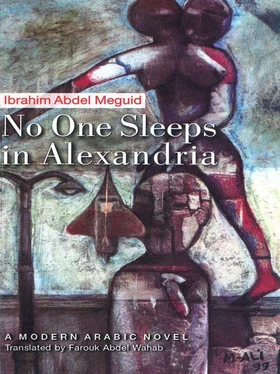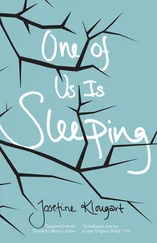As the audience laughed boisterously, Magd al-Din stepped forward to help Dimyan up, but Dimyan suddenly leapt on the juggler’s back, sitting on it in such a way that the man was forced to stoop. Dimyan rained blows on the back of the man’s neck, then jumped off and stood waiting for a fight. But the juggler looked at him, then ran and gathered his pile of things in his cloth bag and ran away.
The money that he had collected was scattered every-where, and everyone in the audience, young and old alike, rushed to pick it up. Magd al-Din and Dimyan left in silence, turning into Nabi Danyal Street toward Raml Station. After they had moved far enough away, Magd al-Din could not help asking Dimyan, “What did you do that for? We all know that the juggler’s a trickster, but it’s a show and a livelihood for him.”
“I don’t really know why I did it, Sheikh Magd. I only meant to have some fun with him.”

Magd al-Din had never seen the world as colorful as it was that day. In the village, the feast also had children playing games, watching puppet shows, and engaged in other distractions. In the village, children’s clothes were also new, but something there always made them appear old, perhaps because of bad fabrics and poor designs. Certainly the dull colors of the houses there and the dust kicked up by the donkeys that the children rode had something to do with making things appear older than they were. He did not want to remember the village now, anyway — let Alexandria take him to her heart. The open space here was whiter than Ghayt al-Aynab; the expansive blue sea inspired a feeling of serenity and rest. The clouds had left the city today, the wind calmed, and people were told to go out and have a good time.
“Battleships all the way to Bahari and Maks — English, French, Australian, and otherwise,” said Dimyan to Magd al-Din when he saw him staring at the eastern harbor in the distance, and the military ships that filled it, with their foreign flags and big and small cannonry on board, and a few soldiers moving on the decks. Next to the ships, their shadows moved, up and down with the movement of the waves. Could Hitler actually make it all the way to Alexandria? Everything around Magd al-Din seemed to suggest that, ever since he had arrived. It was noon, and the statue of Saad Zaghloul loomed tall and awe-inspiring as he looked at the sea, pointing downwards. In the park below him, the children were having fun, and young men and women were sitting in peace. It was a splendid autumn day on which the rain-keeper kept the rain away from the happy people.
“Those are Australian soldiers.”
Magd al-Din was looking at a number of tall soldiers with blue berets.
“They speak English like the English soldiers, but they’re taller,” Dimyan continued. “If you see two soldiers together, the taller one is usually the Australian. Their country is big.”
Magd al-Din wanted to tease his friend. “What good would it do me to tell the Australian from the English?”
Dimyan looked at him for a moment, then smiled and replied, “True. What good would it do you or me? Perhaps just speaking about things has uses that we don’t know.”
They laughed and kept walking. As they passed some African and Indian soldiers, Dimyan said, “Soldiers from all over the world. The Africans have little tails — everybody says that. The Indians are so full of themselves, they walk like they’re lords of their own manor. You know something? I wish I could go up behind one of them, slap him on the back of the neck, and run.”
“These are poor men, Dimyan. They left their countries against their will, and none of them know whether they’ll go home or not.”
Dimyan fell silent, truly touched. A number of English soldiers appeared on the corniche, and a few of them were women. Some of the men had put their arms around the women, and some kissed quickly as they walked. Out of nowhere, many horse-drawn carriages appeared from behind, engaged in a mad race, carrying local lovers, foreign lovers, and drunken soldiers, both men and women. The pedestrians tipped their hats and berets to the riders, and the air filled with boisterous revelry.
“We are now in Manshiya. This is the statue of Ismail Pasha,” said Dimyan, pointing to its semicircular pedestal. “Ismail Pasha is King Farouk’s grandfather, or his relative, anyway. He was the one who built the Ismail Maternity Hospital. They say he’s the one who built the city of Ismailiya, that he was the one who first moved to educate girls.”
Magd al-Din did not need to hear anyone talking, but he let Dimyan continue. He really wanted to drink in the light, the refreshing breeze, and the water of the sea. He felt his chest expanding, and his spirit revived. He would postpone the noon prayers until mid-afternoon, or even wait until he went home at sunset. Dimyan had told him that they would walk to Anfushi, and he was happy for that. Dimyan must have sensed his friend’s secret desire and stopped talking. They walked in silence.

When it had rained during Ramadan, some streets, as well as the untiled sidewalks, became muddy. In the early morning, people going to work and students going to school walked as close as possible to the walls. At the Sidi Karim roundabout, Magd al-Din saw the water collecting near the sidewalks; it was so high people had to wade through to cross the roundabout or to reach the streetcar. The road there was paved, but it lay at the bottom of the slope that began at Raghib Bridge. The narrow sewers could not handle all the water.
Magd al-Din saw three barefoot young men standing on the sidewalk, their pant legs rolled up to their knees, wearing old, tight pullovers torn at the elbows and shoulders. For two pennies per person, they were offering to carry pedestrians from one sidewalk to the other or to the streetcar stop. Some pedestrians had placed a row of stones, a sort of bridge to cross the street, but the three young men removed the stones so that they were the only bridge. The women and girls had to walk all the way to Raghib Bridge and cross at the other side, where there was barely any water, then go back to the streetcar stop.
One of these young men was Hamidu, the only son of the woman who sold vegetables at the entrance of the house opposite Dimitri’s, and who had an amazing story to tell Zahra every time she bought anything from her. Hamidu had a long scar on his cheek and looked quite strong. After finishing this odd work, he would lug his shoeshine box and tools on his shoulder and head for the public squares or the cafés. Hamidu’s hair was always disheveled, giving the impression at first that he was crazy. He never talked to anyone on the street and was never seen without his shoe brush in one hand and in the other a falafel sandwich, which he would wolf down part way, then place whatever was left of it in the first crack in the wall that he came across.
Magd al-Din saw Hamidu carrying people across the street for a few pennies and asked Dimyan whether this strange kind of work was common in Alexandria. Dimyan told him that only happened on the hungriest days.
Hamidu’s image haunted Magd al-Din as he walked with Dimyan along the coast in Bahari and Anfushi. The wind made the tops of the tall, elegant Indian palm trees sway, their lush green fronds waving in front of the baroque balconies and facades of the old apartment buildings. The air here had the taste of cool, fresh water; the corniche curved gently, and the small fishing boats rested on the shore, nets piled high or stretched out, and no fishermen in sight. Today was the feast, and God was watching over everything and everyone.
Читать дальше













